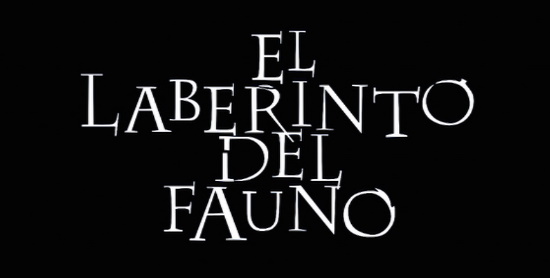
After badmouthing this film so resolutely, I felt I had to return to it and give it a fair shake. After all, Pan's Labyrinth is the "spiritual sequel" to The Devil's Backbone, something Del Toro claims in the commentary track but something I (and I think most people) picked up immediately on first viewing of this.
For the most part I agree with my diatribe, that Del Toro is like (probably) every other fantasy or sci-fi director out there, and he is at his best when given a box he has to creatively think his way out of, rather than when he is given every tool in the chest and a limitless sandbox to build a world into. Pan's isn't as bad as I made it sound -- it's incredibly watchable, and exciting and fun and emotional -- but it's not really about much. What does our protagonist want? To escape the miserable world of reality. What stands in her way? Not nothing, exactly, but surprisingly little. The various complications of the adult world (here exemplified by fascists and rebels in 1944 Spain, though honestly couldn't this story work in almost any time, place, and circumstance?) and her own short-sighted hubris, I guess. Does she get what she wants? She does, by dying (an interesting choice, to be sure) and letting her soul wake up as a princess of the Underworld.
Meanwhile, there's the second story going on here, which actually I'm pretty sure gets more screen time: the drama of Captain Vidal and his troops versus the rebels in the woods and his treasonous house-staff. The problem here is they might as well be cartoon characters, they're all so two-dimensional and obvious. The parts are all well performed, but nobody's given much to work with. Vidal is a tyrant and a true clock-watching fascist through and through; the mother is a foolishly good-hearted woman too desperate to see the dangerous man right in front of her for what he really is; the maid and the doctor are your standard-issue double-agent freedom fighters, sneaking supplies from under Vidal's nose out to the rebels; and the rebels are a mostly faceless group of guerillas with sharp-shooters, wounded men and a loving brother among them, who somehow win in the end against all odds (in a major power switch we mostly pass over in favor of chasing Vidal and Ofelia through the hedge maze). None of these roles have much in the way of contradictions or unexpected quirks to their characters; none of them seem to offer much to the tapestry of the story.
Vidal's obsession with having an heir is his Achilles' heel in the war with the woodsmen (in his own words, his "pride" is his weakness), and his savage disinterest in Ofelia's mother's well-being actually aids Ofelia in her quest to escape reality by severing her singular meaningful tie with it. With Mom out of the way, there's almost no reason to mourn the child's passing -- which is to say, if her goal is "to escape reality and become a fairy princess" and she gets there without any real sacrifice, you end the film with the sense that not much was at stake for her. She didn't lose anything (that she hadn't already lost) in order to gain this new thing, and the victory feels cheaper for it. Further, she didn't even make the choice herself. Aside from protecting her infant brother from Vidal, the decision to "shed innocent blood" wasn't a conscious step on her part, and although the Underworld King and Queen claim she completed the final test by shedding her own blood rather than an innocent's, she didn't even put herself in front of the bullet; Vidal's (badassedly off-hand) murdering of Ofelia was a total shock to us and to her, and only happened by good fortune to satisfy the final quest to get the fairy princess back into fairyland.
I'll admit, I think analyzing the story this way is missing the point of the kind of fairy tale being told here. The thing is I can't help it. I watch a film and I read its story and look for meaning, and layers in that meaning. That's what I do. Pan's Labyrinth plays out like a uniquely dark (though perhaps a little too novel-for-its-own-sake) wish-fulfillment story. Little girl is born into a bad life, someone comes along and promises her something better, she perseveres in the face of various obstacles and is granted, in a twisted sort of way, her wildest desire. It's Cinderella. But a little more time spent on fleshing out the dimensions of the characters or tying the various stories together a little more would have gone a long way in taking a gorgeous piece of escapism and making it the masterpiece that Devil's Backbone was. This is more like its prettier, lesser shadow than it is a spiritual sequel, in my eyes. More polish, but less presence.

No comments:
Post a Comment